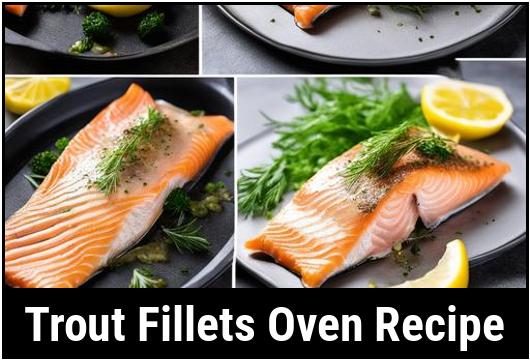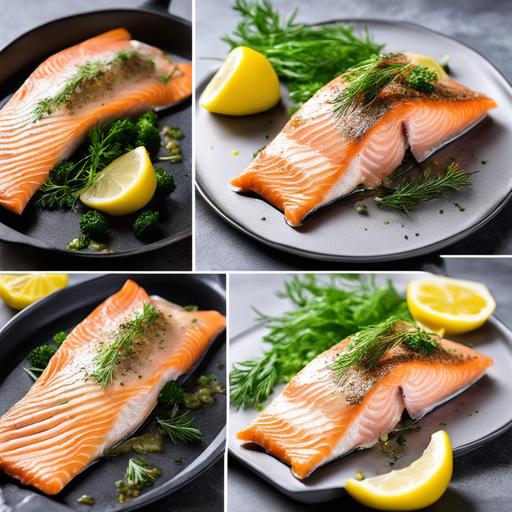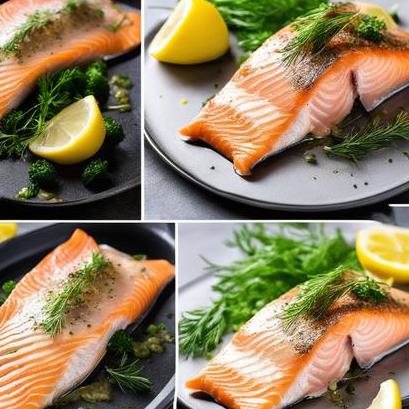
Trout Fillets Oven Recipe: A Comprehensive Guide
If you’re a seafood lover looking for a delectable and healthy meal, then trout fillets are an excellent choice. These tender and flaky fillets are not only delicious but also packed with essential nutrients. In this comprehensive guide, we will walk you through everything you need to know about cooking trout fillets in the oven. From selection and cleaning to preparation and cooking techniques, we’ve got you covered. Get ready to impress your friends and family with this mouthwatering recipe that will leave everyone craving for more!
Food Science: Why Trout Fillets?
Fish, in general, are considered a superfood due to their high protein content and rich source of omega-3 fatty acids. Trout, a freshwater fish, falls into this category and offers an array of health benefits. Omega-3 fatty acids are essential for brain and heart health, reducing inflammation, and promoting overall well-being. Additionally, trout is a great source of vitamins such as B12, D, and selenium, which are crucial for maintaining a strong immune system and healthy bones.
Culinary Details: Selecting the Perfect Trout Fillets
To ensure the success of your trout fillets oven recipe, it all starts with selecting the right fish. Look for fresh trout fillets with vibrant pink flesh and a mild, slightly sweet aroma. Avoid any fillets that have a strong fishy smell or appear dull in color, as these may be indications of age or spoilage.
Cleaning the Trout Fillets

Before diving into the preparation process, it’s important to clean the trout fillets properly. Rinse them under cold running water to remove any surface bacteria or scales. Pat them dry with a paper towel to ensure a crispier texture when cooked. Additionally, don’t forget to remove any pin bones, which are the tiny bones that can be found along the fillet. Use a pair of fish tweezers or pliers to gently pull them out, ensuring a pleasant dining experience without any unpleasant surprises.
Preparation: Marinades and Seasonings
To add depth and flavor to your trout fillets, marinades and seasonings play a crucial role. There are numerous options available, depending on your personal preferences. A simple yet delicious marinade can be made by combining olive oil, lemon juice, garlic, and herbs such as dill or thyme. Allow the fillets to soak in the marinade for at least 30 minutes, allowing the flavors to infuse into the fish.
When it comes to seasonings, remember that trout has a delicate flavor that can be easily overwhelmed. Simple seasonings such as salt, black pepper, and a touch of paprika can enhance the natural taste of the fillets without overpowering them. Alternatively, you can experiment with citrus zest, fresh herbs, or even a sprinkle of cayenne pepper for an extra kick.
Tips for Cooking Trout Fillets Perfectly
Cooking trout fillets in the oven requires precision to achieve that tender flakiness and retain their natural flavors. Here are some valuable tips to keep in mind for a successful culinary experience:
-
Preheat the oven: Before placing the fillets in the oven, make sure it’s preheated to the recommended temperature. This allows for even cooking and prevents the fish from becoming dry.
-
Use parchment paper or aluminum foil: Line a baking sheet with parchment paper or aluminum foil to prevent the fillets from sticking. This also makes cleaning up much easier.
-
Oil or butter the fillets: Lightly coat the fillets with oil or butter to help them retain moisture and prevent them from sticking to the baking sheet.
-
Avoid overcooking: Trout fillets are delicate and can easily become dry if overcooked. Keep a close eye during the cooking process and use a timer to ensure precise doneness.
-
Consider a hot and fast approach: For a crispy exterior and perfectly cooked interior, consider cooking the fillets at a higher temperature for a shorter duration.
Doneness Checks: How to Tell When Trout Fillets are Cooked

Determining the doneness of trout fillets can be challenging, especially for those new to cooking fish. Here are a few reliable methods to ensure your fillets are perfectly cooked:
-
Flesh color: Raw trout fillets have a translucent appearance, but as they cook, the flesh turns opaque and easily flakes. Use a fork to gently separate the flakes, and if they easily come apart, the fish is ready.
-
Internal temperature: Using a food thermometer is the most accurate way to determine doneness. Insert the thermometer into the thickest part of the fillet, and when it reaches 145°F (63°C), your trout fillets are safe to consume.
Mouthwatering Trout Fillets Oven Recipe
Now that we’ve covered the essential aspects of cooking trout fillets in the oven, it’s time to dive into an irresistible recipe that will leave your taste buds begging for more. Here’s a delightful recipe that highlights the flavors of the trout while incorporating a hint of tanginess:
Ingredients:
-
4 trout fillets
-
2 tablespoons olive oil
-
Juice of 1 lemon
-
2 cloves garlic, minced
-
1 teaspoon fresh dill, chopped
-
Salt and black pepper to taste
Instructions:
-
Preheat your oven to 400°F (200°C) and line a baking sheet with parchment paper.
-
In a small bowl, whisk together the olive oil, lemon juice, minced garlic, fresh dill, salt, and black pepper.
-
Place the trout fillets on the prepared baking sheet and generously brush the marinade on both sides of each fillet.
-
Let the fillets marinate for 30 minutes at room temperature, allowing the flavors to infuse.
-
Once marinated, place the baking sheet in the preheated oven and bake for 10-12 minutes, depending on the thickness of the fillets.
-
Check for doneness using the flake test or a food thermometer. The fish should easily flake with a fork and have an internal temperature of 145°F (63°C).
-
Once cooked, remove the fillets from the oven and let them rest for a couple of minutes before serving.
-
Garnish with fresh dill sprigs and lemon slices for an extra touch of elegance.
-
Serve your trout fillets hot with a side of roasted vegetables or a refreshing salad. Enjoy!
Variations and Serving Suggestions
While this recipe is undoubtedly delicious on its own, there are endless possibilities for variations and serving suggestions. Here are a few ideas to inspire your culinary journey:
-
Citrus Twist: Substitute lemon juice with lime or orange juice for a citrusy variation that adds an exciting flare to the flavor profile.
-
Herb Medley: Experiment with different herbs such as thyme, rosemary, or parsley to add depth and freshness to your trout fillets.
-
Panko Crust: If you enjoy a crispy texture, try coating the fillets in a mixture of panko breadcrumbs, grated parmesan cheese, and your favorite herbs before baking.
-
Serving Suggestions: Serve your trout fillets with a side of roasted asparagus, quinoa pilaf, or creamy mashed potatoes for a well-rounded and satisfying meal.
Conclusion
Cooking trout fillets in the oven is an ideal way to enjoy a healthy and flavorful seafood dish. Armed with the knowledge of selecting fresh fillets, proper cleaning techniques, and essential tips for cooking, you are now ready to embark on this culinary adventure. With our mouthwatering recipe and variations to suit your preferences, you can confidently serve a perfectly cooked trout fillet meal that will impress your guests and leave them coming back for seconds. Start gathering the ingredients and let your taste buds explore the delightful world of oven-baked trout fillets!
Sources
FAQS On Trout Fillets Oven Recipe
What Is The Recommended Oven Temperature For Cooking Trout Fillets?
The recommended oven temperature for cooking trout fillets is 375°F (190°C). This allows the fillets to cook evenly and ensures a crispy exterior.
How Long Should Trout Fillets Be Cooked In The Oven?
Depending on the thickness of the fillets, they should be cooked for 10-15 minutes at 375°F (190°C). Thicker fillets may require an additional 5-10 minutes.
What Are Some Good Seasonings To Use On Trout Fillets?
Some popular seasonings for trout fillets include lemon pepper, dill, garlic, and Cajun seasoning. You can also try a simple mix of salt and pepper for a more subtle flavor.
How Do I Know If The Trout Fillets Are Fully Cooked?
The best way to determine if the fillets are fully cooked is to use a meat thermometer. Insert the thermometer into the thickest part of the fillet, and it should read at least 145°F (63°C) for fully cooked fish.
Can I Use Foil Or Parchment Paper When Cooking Trout Fillets In The Oven?
Yes, using foil or parchment paper is a great way to prevent the fillets from sticking to the baking dish and to make clean-up easier. Just make sure to lightly oil the foil or parchment to prevent the fish from sticking.


